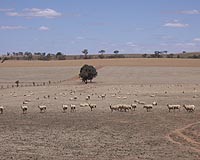Water crisis uproots Syrian farmers
By Khaled Yacoub Oweis SHAIZAR CASTLE, Syria (Reuters) – Only a few decades ago, fish were plentiful in the Orontes river which for thousands of years has provided water to the lush Syrian plains, at the crossroads of the ancient world. These days the Orontes’s 12th century norias, enormous water wheels famous for their distinctive creak, barely turn in the weak tides. Algae covers the river’s surface and the desert has been closing in. “The river has become so polluted. The quality of our produce has suffered and there is barely enough now to feed my family,” said 80-year-old farmer Mohammad al-Hamdo. Syria’s worst drought in decades has displaced hundreds of thousands of people and raised calls for a coordinated water policy for the Middle East as the region faces a dryer climate and water supplies depleted by damming and water well drilling. Yet whether a coordinated water policy is even possible is in doubt in a region riven by tensions and rivalry and where water politics is often seen as a zero-sum game. The Euphrates River, which flows from Turkey through Syria and Iraq, is polluted and salinized. Damming by Turkey and demands for water by ballooning populations have drastically reduced its flow. Mohammed Okla is among an estimated 200,000 to 250,000 Syrian farmers and their families who in the past three years have been forced to abandon their land due to drought, according to a recent United Nations study. “I lost two-third of my cattle after the water wells dried up,” said Okla, who fled the badly-hit eastern Hasaka province five months ago and now lives in a tent with his two wives and 15 children next to the main garbage dump in Damascus. Okla’s family have turned from wheat and cattle farmers into virtual refugees. Flies cover the faces of his barefooted children who play among scraps of metal and trash pulled from the dump as substitute toys “We can hardly buy bread and tea to feed ourselves. No government official sees us. We received no help,” he said. Farmers from areas as close as 30 km (19 miles) to Damascus have deserted their land for tents, or shantytowns. … “Olive oil, which we export to Europe, is becoming more sour every year. The rivers are growing weaker and more and more sewage is being dumped into them. The government seems helpless,” said Kurdish farmer Hassan Siwa. …
